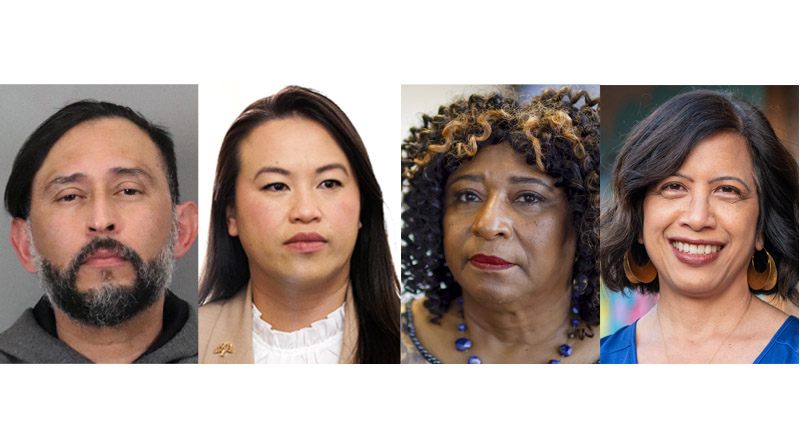With Bay Area elected officials giving up their posts because of election recalls or promotions, or forced from office because of pending criminal charges, the rush to replace them has begun.
The guiding principle should be simple: Voters deserve the final say in the selection of their representatives. And current elected officials should not try to put their thumbs on the scales.
But that’s not what’s happening in some cases. Let’s review the divergent processes for replacing four key elected officials in the South Bay and East Bay.
Omar Torres
San Jose City Council members decided this week to call a special election to fill the District 3 vacancy created when Torres resigned hours before he was arrested Nov. 5 on suspicion of child molestation.
The election could be held in April, with a runoff if needed, pushing the results to the summer. So councilmembers will also make an interim appointment. But they will wait until after the election filing deadline to avoid selecting a candidate who could benefit from an incumbency advantage.
The council deserves credit for giving voters the choice and not trying to sway the outcome. It’s a stark contrast to two years ago when the council insisted on filling two openings by appointment.
A poll at the time showed that 86% of city residents favored a special election to fill the two vacancies. Yet councilmembers, who didn’t live in the two affected districts, picked those residents’ representatives.
Pamela Price
Unfortunately, Alameda County voters won’t get to pick the immediate successor to recalled District Attorney Pamela Price.
Under the county charter, the Board of Supervisors makes a temporary selection to fill the post until the next general election, in 2026.
Ideally, the board would select someone who promises to serve only until then. Otherwise that person would have a major incumbency advantage in the election.
The winner of the 2026 election will serve until the end of 2028 when Price’s original six-year term expires. The unusual six-year term stems from a state law passed in 2022 realigning district attorney races in California to coincide with presidential election years.
Sheng Thao
Oakland residents will pick the successor to recalled Mayor Sheng Thao. Under the city charter, a special election must be held within 120 days of the official declaration of the vacancy, which the City Council is expected to make at its Dec. 17 meeting.
Until a replacement is chosen, the council president will serve as acting mayor. Currently, the council president is Nikki Fortunato Bas. But she just won a seat on the Alameda County Board of Supervisors, a term that starts Jan. 7.
So she could serve as acting mayor for about three weeks. After that, the new Oakland council must select a new president, who will immediately become acting mayor.
Nikki Fortunato Bas
Oakland District 2 residents will select Bas’ replacement on the City Council. As it does for the mayoral replacement, the city charter calls for holding an election within 120 days of a vacancy.
The council can also appoint a temporary replacement if “the period of the vacancy … equals or exceeds 100 days.” The charter wording forbids the appointment of someone who is also a candidate in the replacement election.
Related Articles
Trump chooses Bessent to be treasury secretary, Vought as budget chief, Chavez-DeRemer for Labor
Vance takes on a more visible transition role, working to boost Trump’s most contentious picks
Cupertino: City Council race heads to recount
Matt Gaetz says he won’t return to Congress next year after withdrawing name for attorney general
Attorneys want the US Supreme Court to say Mississippi’s felony voting ban is cruel and unusual
The charter wording is unclear on whether the council can immediately make the temporary appointment if it knows the election is at least 100 days away, or the council must wait until the 100th day of vacancy is reached before making the appointment.
The other twist Oakland officials face is the alignment of the special mayoral and council elections.
If Bas opts to keep her council seat until Jan. 7, then the 120-day clocks for the mayoral and council replacement elections will be at least 20 days out of sync. To align the two elections, city officials would need to plan ahead and shorten the period for the mayoral election.












